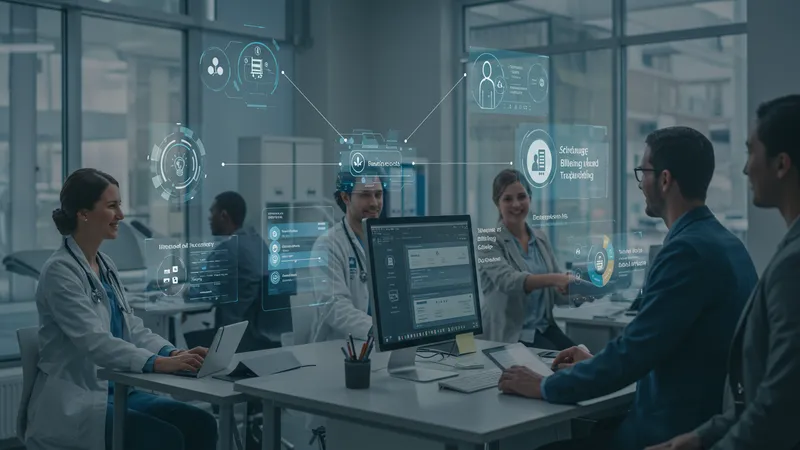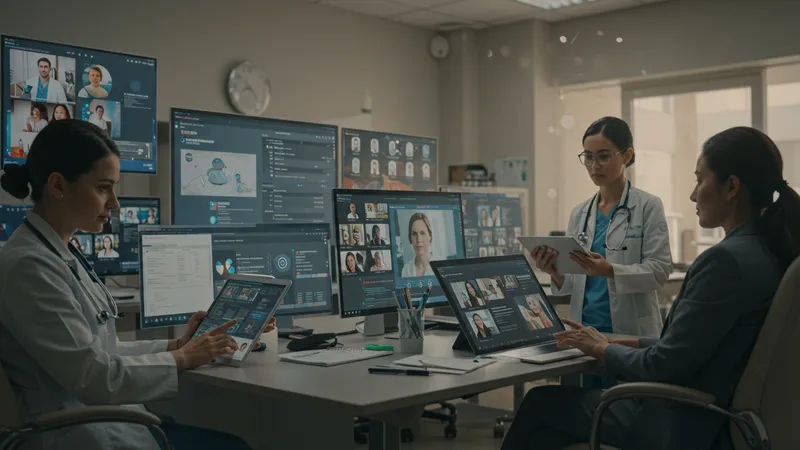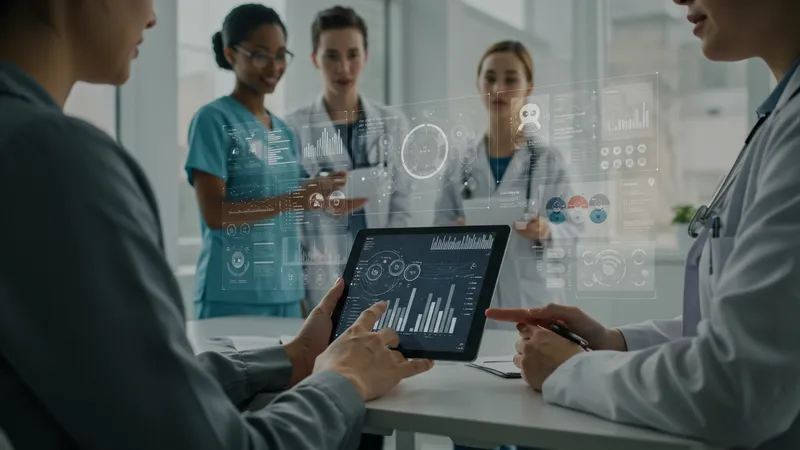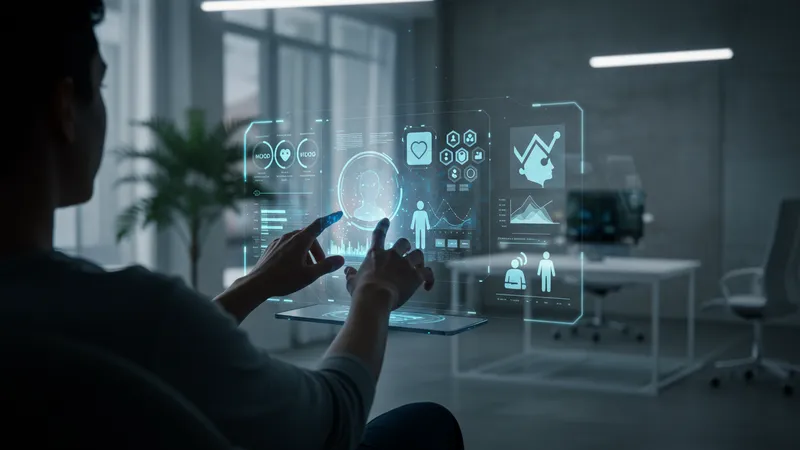


Did you know that the way we experience healthcare is on the brink of a monumental shift? Yes, patient engagement software and practice management tools could change your next doctor's visit forever.
With healthcare demands soaring, these technologies are more critical than ever. They promise efficiency, transparency, and a transformative patient experience that's hard to ignore.

Picture this: no more endless wait times or confusing medical jargon. Patient engagement software is redefining healthcare interactions, making them more personal and efficient. Imagine receiving reminders, accessing records, and even consulting with doctors—all through one platform. The way these systems integrate into everyday healthcare operations is mind-blowing. But that’s not even the wildest part…
On the other side, practice management tools are set to revolutionize administrative efficiency. From scheduling to billing, these tools streamline processes that once took hours, freeing up valuable time for healthcare providers to focus on what truly matters: patient care. But that’s not even the wildest part…
You won't believe what comes next. The next chapter in patient-provider relationships could redefine healthcare forever. Experts admit, “What happens next shocked even the experts…”
Patient engagement software is transforming how healthcare is delivered by placing patients at the center of their care. This technology facilitates communication between patients and providers, enabling features like appointment scheduling, reminders, and personalized health advice. This revolution is not only about convenience but also about empowering patients to take control of their health. When patients are engaged, studies have shown that their outcomes improve dramatically, reducing the need for emergency interventions. Yet, the scope of influence these tools wield is just beginning to surface.

What's often overlooked is the significant reduction in operational costs. By digitizing records and processes, healthcare facilities can cut down on staffing costs and administrative work, which can strain medical practices. Patient engagement platforms make it easier to handle large volumes of patient data without the need for cumbersome paperwork. These cost savings are often passed down to the patients, making healthcare more affordable, but there’s a lesser-known dimension yet to be revealed.
Despite the benefits, there are challenges to adoption. Many healthcare providers find integrating patient engagement software into existing systems daunting. Concerns about data security and patient privacy also loom large, discouraging some institutions from making the switch. Yet, those who overcome these barriers report not only improved workplace efficiency but also a significant boost in patient satisfaction—a factor crucial for staying competitive in today’s age. And that’s not where the story ends.
As the use of these tools matures, critical new developments are emerging. Advanced analytics derived from patient data are starting to inform treatment options, predictive medicine, and personalized health plans. This unseen potential of patient engagement software promises to unlock more revolutionary changes as digital record-keeping evolves. What's coming next—and how it interacts with traditional systems—might change the focal point of healthcare forever.
Practice management tools, though largely operating behind the scenes, are crucial in modernizing healthcare administration. These tools integrate scheduling, billing, and patient tracking into one seamless system, reducing the workload of healthcare providers. By automating routine tasks, practices can focus more on patient care rather than paperwork. These tools enable facilities to manage resources more efficiently, leading to optimal staff allocation and resource use, but that's not where the benefits stop.

One compelling advantage of practice management software is its ability to optimize billing accuracy. Mistakes in billing can lead to significant revenue losses in healthcare facilities. With practice management tools, claims are easily tracked, and errors are minimized, leading to faster reimbursements. This accuracy is vital for maintaining the financial health of a practice, but surprisingly, it also plays a role in patient relations. When billing is mistake-free and transparent, patient trust and satisfaction increase substantially. But here’s the twist you’ve never considered.
Data from practice management software is a gold mine for improving patient management and care. By analyzing patterns in bookings, cancellations, or treatment outcomes, healthcare providers can glean insights to improve operational efficiency and patient engagement. Predictive modeling, backed by the wealth of data collected over time, can even assist in anticipating patient needs and improving clinical decisions. This predictive capacity is a groundbreaking leap towards more informed and tailored patient interactions, but there’s still one more unexpected advantage.
Innovation in practice management tools continues as AI and machine learning become integral components. These advanced technologies promise to amplify the capabilities of these tools, leading to unprecedented efficiency in administration. Imagine a system that can predict staffing needs, optimize shift schedules, or even forecast patient flows. The integration of AI is set to propel practice management into a new era of efficiency and patient-focused care without negating the human touch that's so critical in healthcare. And yet, there's a key element that ties all these together.
In today's fast-paced world, effective communication between patients and providers is paramount. Patient engagement software has begun to profoundly alter this dynamic by facilitating secure messaging, virtual consultations, and real-time updates. With these tools, patients are no longer passive recipients of healthcare but active participants in managing their well-being. This shift not only enhances the patient experience but also diminish the feeling of being 'just another patient' in the healthcare system. However, there’s an overlooked layer to this evolution that deserves attention.

Telemedicine, fueled by engagement platforms, has broken down traditional barriers, making healthcare more accessible than ever before. More people can now reach specialists who once seemed out of reach. Video consultations and remote monitoring technology mean healthcare can be delivered almost anywhere at any time. This accessibility is revolutionizing traditional patient-provider interactions, offering solutions tailored to individual needs and cutting down on travel and wait times. But this isn't the full story.
Emerging tools are going a step further by personalizing the patient journey based on data analytics. Personalized care plans and health coaching, delivered through apps and portals, cater to individual health goals and benchmarks. This tailored approach motivates patients to stay engaged with their health plans, improving adherence and outcomes. In some cases, predictive analytics can anticipate health issues before they become severe, offering interventions when they're most effective. Yet, there’s an undercurrent driving this shift that few recognize.
As these platforms grow in prominence, they are fostering a culture of transparency and accountability. Clear communication between patient and provider leads to better understanding, fewer misunderstandings, and improved health outcomes. Patients feel empowered when they have access to their own health information, which encourages them to contribute more meaningfully to their health regimens. This cultural shift is central to reshaping healthcare relationships, and as it gains momentum, it hints at an even more profound transformation just around the corner.
Artificial intelligence is a game-changer in healthcare, offering new possibilities in patient engagement that we could have only dreamed of a decade ago. AI-powered systems can analyze complex data at speeds unmatched by humans, leading to quicker diagnoses and more personalized treatment plans. Patient engagement tools equipped with AI can automatically handle tasks like appointment bookings and medication reminders, freeing up valuable time for healthcare staff. But there's an astonishing inner mechanism at play that's worth probing further into.

Enhanced by AI, engagement platforms can monitor patient behavior patterns to identify early warning signs of health issues. Through continuous data monitoring and analytics, AI has the potential to predict patient needs with remarkable precision. For example, sudden changes in a patient's activity levels, detected through wearable devices, can trigger alerts prompting timely interventions long before a patient experiences serious symptoms. This predictive capability holds the promise of not just managing but preventing health crises. Still, the story doesn't just end here.
AI integration into patient engagement systems also opens up new channels of remote care. Imagine an AI assistant that provides personalized health advice based on your medical history, current conditions, and lifestyle choices, all while ensuring your data's security. The potential to manage chronic conditions remotely or receive expert insights without leaving home becomes very real with AI. These capabilities herald an era where healthcare is a part of everyday life, not just an event, contributing to smarter and healthier living. But there’s a final element redefining this shift, which adds an unexpected twist.
Despite the technological advances, the essential human element in healthcare cannot be displaced. While AI provides significant aid in managing routine tasks and enhancing engagement, it is the compassion and empathy of healthcare professionals that remain at the heart of the patient experience. The real transformation arises from blending AI's efficiency with the irreplaceable human touch, offering a holistic approach to healthcare that equips providers to deliver patient care in a manner that is both technologically advanced and profoundly personal. Stay tuned as future developments in AI continue to reshape what we know about patient-centered care.
As technology continues to advance, the intersection between digital tools and personal care is becoming more apparent. Patient engagement software has bridged a significant gap by offering technological solutions that do not compromise the human element in healthcare. By automating routine processes, these tools free up time for healthcare providers to focus more on personal interactions with patients. The key lies in finding the right balance where technology complements human expertise, a balance that is fundamental for the future well-being of patients. Yet, the implications are deeper than one might assume.

The integration of telemedicine and patient engagement platforms is a testament to how digital health tools can enhance, not replace, the traditional care model. Patients now have virtual access to care with the comfort of knowing that their healthcare provider is just a click away. This digital convenience runs alongside in-person interactions that build trust and rapport over time. Blending the two offers a comprehensive approach, combining the best of both worlds. But there's still another layer to this transformation.
While the prominence of digital tools in healthcare is rising, the importance of empathy in patient care remains unchanged. Technologies that include AI and predictive analytics provide support, but they cannot replicate the empathy and understanding that human practitioners offer. Acknowledging this human aspect ensures that as tools and capabilities evolve, they serve to enhance the patient experience and not become a barrier to care. The ongoing evolution raises key questions about the role empathy plays alongside technology.
As we move forward, the future of healthcare will require a synergy where technology and human touch are not in competition but act together for better patient outcomes. The journey of integrating these components is ongoing, with healthcare staff at the forefront of ensuring that all patients receive care that is both empathetic and efficient. It's a challenging task but one that promises an improved healthcare landscape, where technology aids, but never takes the place of, fundamental human interactions. This complementary approach is pivotal to healthcare's future, with new developments constantly redefining patient engagement.
Patient engagement software has profoundly impacted remote and underserved communities, dramatically changing how healthcare is accessed and delivered. In areas where healthcare facilities are scarce, these tools have enabled people to receive quality care without traveling long distances. Virtual consultations and telemedicine platforms have been particularly effective in extending medical expertise to the farthest corners, a development that's quickly gaining global traction. This accessibility revolution is pivotal, yet an unacknowledged factor still lingers.

While technological connectivity makes healthcare accessible, it also ensures continuity of care in areas where follow-up visits could be impractical. Patients can maintain regular interactions with healthcare providers via digital platforms, addressing concerns quickly without enduring the logistical barriers of travel. This continuous engagement is crucial for managing chronic conditions in these communities. However, a surprising hurdle still persists that deserves attention.
Infrastructure readiness varies greatly between regions, and not all remote areas are equipped with reliable internet connectivity or the necessary digital devices to access healthcare services. While patient engagement software holds great promise, its success often hinges upon overcoming these logistical challenges. Collaborative efforts between technology companies, local governments, and non-profit organizations are pivotal in addressing these disparities, ensuring that everyone can benefit from advancements in healthcare technology. There's a broader impact unfolding here that often goes unnoticed.
Through concerted efforts, patient engagement tools not only improve health outcomes but also empower those in remote areas by enhancing health literacy. Educating patients about their conditions and care plans using digital platforms fosters a culture of proactive health management, even in isolated regions. The empowerment through information carries profound implications, nurturing a sense of agency in healthcare decision-making which is essential in such communities. This broader shift in patient empowerment signals a new era in healthcare accessibility and inclusion.
Governments worldwide play a crucial role in promoting the use and adoption of healthcare technology, such as patient engagement software. By implementing policies that encourage digital innovation in healthcare, governments can accelerate the adoption of these transformative tools. Incentives and subsidies for healthcare providers who integrate technology into their practice lead to broader acceptance and utilization. However, policy-making also encounters specific areas of contention and opportunity.

Regulatory frameworks must evolve to keep pace with the rapid technological advances in healthcare. Balancing patient privacy with innovation is a critical challenge that governments face. Laws need to protect sensitive information while allowing the unencumbered flow of data required for technology to function effectively. Successful regulatory strategies not only protect patient information but encourage providers to adopt digital tools confidently, yet an underlying tension still remains unsolved.
The cost of implementing new technology can be a significant barrier for many healthcare facilities. Governments have the capacity to play a role in easing these financial burdens by offering financial assistance, tax breaks, or grants to healthcare providers. By reducing economic barriers, they can promote widespread technology adoption, enhancing healthcare access and efficiency. However, a complex relationship exists, encapsulating more than just financial engagements.
Aside from monetary aspects lies the need for education and training. Governments can support initiatives to train healthcare providers on using new digital tools effectively. Investing in education helps bridge the digital divide and empowers medical professionals to fully leverage technology in patient relations and care management. Fostering a workforce skilled in both traditional and modern healthcare delivery strengthens the overall health ecosystem, paving the way for a more integrated future. This educational investment is key to sustaining healthcare technology's transformative potential.
Automation in healthcare promises efficiency and speed, but it also invites essential discussions about maintaining the human experience. Patient engagement software automates appointment scheduling, prescription refills, and notifications, significantly reducing administrative duties that burden healthcare providers. This efficiency is vital for the smooth operation of healthcare systems, yet the core human experience remains irreplaceable. These dual benefits prompt important reflections on future healthcare models.

The automation facilitated by engagement tools comes with the risk of alienating patients who value personal interactions. For some patients, human contact might provide reassurance and clarity about their health conditions. When technology overshadows personalized interactions, it may inadvertently lead to a reduction in patient satisfaction. Healthcare systems, therefore, must be steadfast in ensuring that automation does not come at the expense of empathy and human touch, revealing broader implications in patient-provider relationships.
To effectively balance automation with the human experience, healthcare facilities must strategically incorporate technology that enhances, rather than detracts from, interactions. For instance, automated data capture systems can free up professionals to spend more time listening and responding to patient concerns. Thus, the key lies in deploying technology wisely to improve the quality of care and personal interactions, fostering a more responsive and empathic healthcare environment. These technological applications illuminate unexplored pathways in healthcare evolution.
Ultimately, the integration of automation and human interaction will define the success of future healthcare systems. By opting for tools that streamline tasks while prioritizing patient engagement, providers achieve an optimal blend that retains a patient-centered approach. This synergy ensures that technology serves to enhance the care experience, not replace it. The coordinated dance between technology and human presence illustrates how future practices can cultivate compassionate, efficient, and meaningful healthcare experiences.
The value of patient data in transforming predictive healthcare is monumental, creating avenues for prevention rather than just treatment. With patient engagement tools, data collection is seamless, providing an enormous repository of information that can predict health trends and outcomes. When analyzed, this data offers incredible insights into patterns that healthcare providers might otherwise overlook, shifting the focus towards proactive rather than reactive care strategies. Yet this data-driven evolution opens up further conversations on practical implementation.

Predictive analytics rely on comprehensive and accurate data collection, a process that necessitates detailed attention to privacy and security. As patient data amasses, safeguarding this sensitive information becomes not only a legal necessity but a trust-building mechanism. Technologies facilitating this collection must be designed to protect data without hindering its accessibility to authorized practitioners. Successfully balancing data security with usability represents a cornerstone challenge in revolutionizing predictive healthcare.
The predictive capabilities introduced by this wealth of data introduce new opportunities for personalized care plans. Physicians can use these insights to predict disease progression and recommend tailored interventions that are best suited for individual patients based on their unique health profiles. This push towards personalized medicine marks a significant advancement in treatment effectiveness and patient satisfaction. Yet, this shift requires more than just technological advancements—it demands a cultural rethinking within healthcare systems.
As healthcare providers embrace a predictive approach, collaboration between data scientists, technologists, and medical professionals is essential. This multidisciplinary collaboration fosters an environment where technology supports medical decision-making processes with data-driven insights. By incorporating predictive analytics into everyday practice, providers arm themselves with the power to transform ordinary healthcare delivery into extraordinary outcomes, fostering a future where medicine is preventive and personalized. This collaborative synergy underscores the transformative power of patient data in healthcare.
In order to redefine patient engagement, health data transparency is becoming an instrumental force. With access to data, patients are increasingly equipped to participate actively in their healthcare decisions. When patients can view test results, medical histories, and treatment plans via engagement software, they gain critical insights into their health journeys. This transparency obliterates the traditional obfuscation around medical details, encouraging patients to take a proactive role in their care. However, a more intricate dimension accompanies this empowerment.

Access to health data empowers patients but simultaneously demands a level of health literacy not all possess naturally. Discerning medical data and understanding implications without proper guidance can overwhelm some individuals, highlighting the need for healthcare providers to offer educational support. Empowering patients through data should be coupled with efforts to enhance understanding and facilitate informed decision-making. Addressing this educational aspect is crucial, providing a pathway toward genuine patient empowerment beyond mere data access.
Health data transparency also plays a role in establishing trust between patients and providers. When information is openly shared, patients feel valued and respected as partners in their care journey. This trust promotes a cooperative relationship where healthcare decisions are collaboratively made. However, transparency also places a responsibility on healthcare providers to ensure that data is presented accurately, comprehensively, and empathetically. This ethical obligation underscores the importance of sincerity and clarity in patient communication.
Ultimately, empowering patients through transparent data practices cultivates a healthcare environment where individuals are more likely to become active participants. As patients engage more deeply with their health information, they can advocate for themselves, align treatment plans with personal preferences, and potentially improve their health outcomes. The ripple effects of this transparency-oriented approach continue to redefine patient-provider dynamics, offering new paradigms for empowered healthcare ecosystems. This empowerment marks a pivotal shift in the way healthcare is conceived and delivered.
The integration of technology within mental health care is gaining momentum, offering innovative solutions that transform traditional practice methods. Patient engagement software tailored for mental health can provide resources ranging from online therapy sessions to mood tracking and mental health assessments. These tools empower individuals to access care conveniently and discreetly, helping to destigmatize mental health treatment. As these capabilities grow, they also introduce novel challenges and considerations that must be navigated thoughtfully.

Technology enables mental health providers to reach patients who might otherwise forgo seeking help due to stigma or geographical barriers. Virtual sessions and remote monitoring provide flexible treatment options that align with patients' comfort and availability. Yet, delivering mental health care through digital means demands a nuanced approach, ensuring that the quality of care and patient rapport remain intact. Finding this balance represents both a challenge and an opportunity within the realm of digital mental health care.
The wealth of data generated through digital engagement tools offers providers valuable insights into patient behavior and trends over time. Through continuous tracking of mental health metrics like mood changes, sleep patterns, and stress levels, providers can tailor interventions and identify potential issues early. However, this data-centric approach must be tempered with sensitivity, ensuring that patient privacy is respected and that technology supplements, rather than substitutes, personal engagement. The ethical landscape surrounding digital mental health care continues to evolve.
Despite these complexities, technology's impact on mental health care is undeniably positive, paving the way for more inclusive and accessible treatment options. By leveraging digital tools thoughtfully, providers can extend their reach, offer more personalized care, and ultimately make strides toward normalizing the conversation around mental health. This transformative potential holds promise for a broader shift in how mental health is perceived, addressed, and managed, highlighting the critical role technology plays in fostering mental wellness.
As we stand on the cusp of a digital renaissance in healthcare, the potential for technology to revolutionize patient care is clearer than ever. Patient engagement software, practice management tools, and innovations in AI all drive us toward more efficient, accessible, and personalized healthcare experiences. However, the integration of these technologies is not without its challenges. Ensuring that advancements support—not overshadow—the human elements of healthcare remains a priority, creating a dynamic interplay between technology and empathy that works for the benefit of all patients.

Technology's role is rapidly expanding, influencing everything from appointment scheduling to predictive analytics and remote patient management. While this evolution promises numerous advantages, healthcare systems must navigate the complex terrain of data security, patient privacy, and equitable access to new technologies. Addressing these trials demands cooperation among technologists, providers, and policymakers. As the future unfolds, this collaboration will be essential in shaping healthcare that is both innovative and equitable.
Ultimately, the ongoing digital transformation reflects a broader shift in the healthcare paradigm, one that prioritizes patient engagement and delivers care in an accessible, patient-centered manner. By harnessing the potential of technology, we can reorient healthcare around the needs of the patient, fostering engagement and empowerment while ensuring that empathy remains at the heart of medical practice. This revolution holds the promise of improved outcomes, enhanced patient experiences, and a healthcare system that is more responsive to the nuanced needs of its diverse population.
As technology continues to evolve, now more than ever, there is a pressing need for thoughtful integration that supports the values of empathy, trust, and transparency in healthcare. The challenge is significant, but so too is the opportunity to reshape healthcare for the better, to cultivate an environment where technology and human touch coexist harmoniously. Taking action today defines the healthcare solutions of tomorrow, propelling us into an age where innovation knows no bounds.
The digital transformation of healthcare, driven by patient engagement tools and smart technology, offers revolutionary opportunities but requires strategic management to align innovation with care values. As hope unfolds towards healthier societies, the healthcare sector stands at a critical juncture where technology either facilitates or fragments patient care. It's a moment rich with potential, beckoning stakeholders to forge a path that marries technical mastery with compassion.
Sharing this vision requires our collective effort. Bookmark this page, share these insights, engage with discussions, and join a movement that embraces technology's transformative power, while remembering the healing necessity of human empathy. As we redefine healthcare's boundaries, there’s no better time than now to seize the momentum for meaningful, lasting change that benefits all. Be part of this journey towards a healthcare renaissance that lifts everyone involved in the care continuum, ensuring health outcomes that are as visionary as they are compassionate.